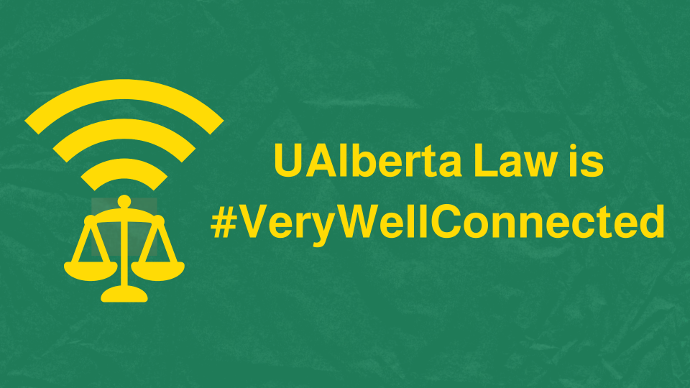#VeryWellConnected: UAlberta Law students show resilience during global health crisis
Sarah Kent - 25 May 2020

Almost overnight, the pandemic changed everything for UAlberta Law students—from their social lives and family obligations to their job prospects—and while the classroom experience also changed, students kept learning.
Zachary Wilson, ‘21 JD, Elisa Carbonaro, ‘22 JD, and Mia Bottos, ‘22 JD, weigh in on what remote delivery looked like for them.
Zachary Wilson, ‘21 JD
When in-person classes were cancelled, Zachary Wilson knew he was going to have an uphill battle to keep learning because of his personal learning style.
“I am someone who benefits from structure,” said Wilson, who enjoyed the learning opportunities outside the classroom that were part of his routine: study groups at the law centre and in-person conversations with students and professors.
Those personal connections are “instrumental in facilitating your success as a law student and ultimately your success as a lawyer,” he said.
He sees the flexibility of remote delivery as a benefit, but finding ways to virtually reproduce in-person study groups and conversations will need creative solutions, he said.
While Wilson is still looking for those solutions, he said that the virtual delivery of courses was very similar to the in-class experience.
“The professors in the small seminar courses went out of their way—as they did in class—to promote student engagement and student participation, which I personally benefit from greatly,” said Wilson.
“We even did trial advocacy via Zoom, which is a challenge many lawyers are experiencing right now,” said Wilson. “One of the benefits of doing law school online is, by necessity, you are learning some of the same skills that lawyers across the country are swiftly discovering to be essential in the age of COVID, and likely beyond.”
Wilson has hesitations about virtual delivery for the fall but expressed his "faith in the creativity, expertise, and commitment" of his professors to continue delivering a strong legal education.
Elisa Carbonaro, ‘22 JD
When Elisa Carbonaro took distance classes during high school and her undergraduate degree, it was not a positive learning experience for her.
“I have taken distance classes—I’m laughing because I’ve never succeeded at them! There was no delivery method or interaction. It was just online modules with a textbook,” she said.
“This was much different,” said Carbonaro, who felt remote delivery at UAlberta Law closely replicated the in-person classroom experience.
“I had everything from live classes at my scheduled time to a flipped classroom,” she said.
“One huge positive that I think should be adopted unanimously is the recorded lecture format,” said Carbonaro. “It was so beneficial to have the ability to go back over my lectures again.”
Like many students, Carbonaro relied on routine and structure for her academic success before the public health restrictions came into effect.
“The biggest challenge is discipline and setting that schedule and having accountability in some way,” said Carbonaro.
She found that accountability in her virtual study groups with other law students, who met every day to review material and write practice problems but also just check in with one another.
Mia Bottos, ‘22 JD
For Mia Bottos, the stress that the pandemic wrought on the end of her first year of law school was compounded by the loss of her grandfather in March.
She leaned on the UAlberta Law community to find ways to keep going.
“Everyone is so committed to creating an atmosphere that is appealing and engaging and welcoming,” said Bottos.
While the pandemic demanded an abrupt transition to remote delivery due to public health restrictions, “the professors that I had really stepped it up,” she said. “They worked overtime to create a great learning experience and to reformat the curriculum.”
Bottos sees a lot of potential in virtual delivery because it makes the university more accessible for students with disabilities or different learning styles.
“In September, other than the fact that it won’t be ideal, I don’t think it will change anything for me,” said Bottos. “I’ll still be excited to learn about all the things”